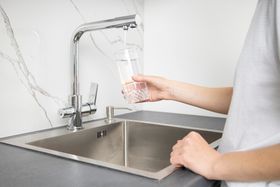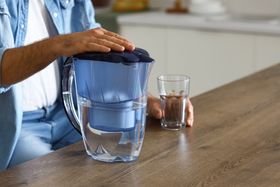Water Softener vs. Reverse Osmosis: Do I Need Both for My Home?
Updated March 24, 2025

Did you know water quality varies, especially drinking water? Not all water is equally healthy, as drinking water quality varies depending on the condition of the water source and the treatment the water receives before reaching us. This is where a water treatment system comes in handy.
Water softeners and reverse osmosis filters, for example, are effective means of tackling hard water. While hard water contains calcium and magnesium, soft water is free from these harsh minerals that can damage your home (pipe systems, taps, and so on) and body. These harsh minerals from tap water can effectively be removed through water softener systems and reverse osmosis—but how do you know which water filter to use and whether you need to combine them for the best results? Find out below.
» Learn which essential minerals your drinking water should include
Why Get a Home Water-Softening System?
Using a water-softening system will add value and save you money by ensuring clean water without the harsh minerals that can clog up the piping in your home, including the washing machine, dishwasher, solar geyser, normal geyser, and everything else water goes through.
So, how does a water-softening system work?
Basically, hard water enters your home from the main water pipe or well and travels to the water softener you've installed. Resin beads in the tank will attract and hold onto hard water minerals, removing them from the water. The softened water then exits the tank and flows into the plumbing throughout your home.
Pros
- Reduces lime build-up on plumbing fixtures
- Extends the life of your plumbing system
- Improves efficiency of water-using appliances
- Will save you money
Cons
- Potential health effects from additional sodium
- Environmental harm
- Expensive upfront cost
Why Get a Reverse Osmosis Filter?
While water softeners “soften” the water, reverse osmosis water systems filter it. While reverse osmosis is less effective at softening hard water, it will remove more impurities than a water softener.
Reverse osmosis is a method of filtering water that removes many contaminants, including heavy metals and sediments like salt, viruses, bacteria, and microorganisms. This process works by pushing water through a semi-permeable or synthetic membrane with small pores that block contaminants but allow water molecules to flow through.
As this process allows only clean water to flow through, reverse osmosis water is considered one of the purest forms of water.
Pros
- Removes pollutants from the water
- Can improve the water's taste and appearance
- Safe, environmentally friendly alternative to bottled water
Cons
- More water wasted
- Can have a fishy odor
- Wastewater requires proper disposal afterward
» Is RO water good for your health? Find out here
Should You Get Both Water Treatment Systems?
Although it might not be necessary to install both systems, depending on your needs and the quality of water being supplied to you, you should consider doing so, and here's why—pairing a reverse osmosis water treatment system with a water softening system provides the best water, resulting in pure, sodium-free water great both for drinking and using around the house.
The Benefits of Pairing Water Softener and RO System
- Prolongs the life of the RO unit – Combining a water-softening system with an RO system increases the longevity of the membrane filtering the water.
- Enhances water quality – By removing all pollutants and harsh chemicals, both systems are leaving you with the purest form of drinking water.
- Reduces expenses – Installing both systems can protect your house appliances and piping from eroding, breaking, or damaging.
However, as RO effectively removes all minerals from your water, remember to remineralize RO water to get the full health benefits of your filtered water.
» Learn ways to add some healthy minerals back and get our mineral drops
Bottom Line
Although it's not necessary to install both water-purifying systems, it's evident that reverse osmosis filters and water-softening systems benefit from one another. Judging by the pros mentioned above for both systems, long-term installation of both water-purifying systems will save you time and money, allowing you to be sure you have the cleanest water possible.
However, as installing both systems can prove exhausting and expensive, getting a MAYU Swirl may be the easiest way to get the cleanest water with no hassle.













































